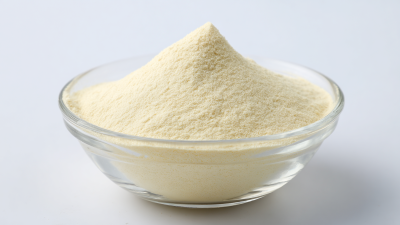In recent years, Bakuchiol Oil has emerged as a preferred ingredient in the beauty and wellness industry, largely attributed to its potent anti-aging properties and natural origin. According to a report by Grand View Research, the global bakuchiol market is expected to grow significantly, fueled by the rising demand for botanical-based skincare ingredients and increasing consumer awareness regarding the benefits of natural products.

Unlike traditional retinol, Bakuchiol Oil is celebrated not only for its effectiveness but also for its milder, non-irritating nature, making it suitable for a broader range of skin types. As businesses seek high-quality sources to meet this burgeoning demand, understanding how to source premium Bakuchiol Oil becomes essential for maintaining competitive advantage and meeting health-conscious consumer expectations. This blog will explore seven essential tips to effectively source high-quality Bakuchiol Oil for your business needs, ensuring both product integrity and sustainability.
Bakuchiol oil has gained significant attention in recent years as a natural alternative to retinol, with a marked increase in its demand driven by the rising consciousness towards clean and sustainable beauty products. The market for bakuchiol oil is projected to grow substantially, with estimates indicating a compound annual growth rate (CAGR) of approximately 9.8% from 2024 to 2030. This trend aligns with broader movements within the beauty and personal care sector, focusing on high-quality, plant-based ingredients that cater to consumer preferences for safer and more effective formulations.
When sourcing bakuchiol oil, quality indicators are paramount to ensure that what is being offered meets industry standards. Key quality markers may include the oil's purity, extraction method, and the presence of active compounds that deliver its anti-aging benefits. Recent insights reveal that products exceeding particular purity thresholds not only provide better efficacy but also foster brand trust and consumer loyalty. As businesses navigate sourcing strategies, emphasizing these quality indicators can differentiate their offerings in a competitive market that increasingly values transparency and high-quality ingredients.
Identifying ethical sourcing practices for sustainable bakuchiol oil is crucial for businesses aiming to make a positive impact on the environment and society. As consumers become increasingly aware of the importance of sustainability, sourcing high-quality bakuchiol oil ethically can set brands apart in a competitive market. Businesses should prioritize suppliers who engage in responsible farming practices, ensuring that their methods do not harm local ecosystems or exploit workers. Transparent supply chains are essential, allowing companies to trace the origin of their ingredients and verify the ethical standards of their sources.
In light of the growing trend towards sustainability, initiatives like the Clean + Conscious Awards highlight the importance of recognizing products that prioritize ethical practices. The celebration of ethical and sustainable products demonstrates a collective shift in consumer expectations, urging brands to take responsibility for their sourcing decisions. By focusing on sustainability in sourcing bakuchiol oil, businesses not only cater to conscientious consumers but also contribute to a broader movement towards environmental and social responsibility. Embracing these practices not only fosters brand loyalty but also aligns with the values of an increasingly eco-conscious market.
When sourcing high-quality bakuchiol oil, understanding the compositional differences among various varieties is essential. Recent studies have shown that the efficacy of bakuchiol largely depends on its source and extraction methods, which can significantly impact its phytochemical profile. According to a report by the Journal of Cosmetic Science, pure bakuchiol derived from *Psoralea corylifolia* exhibited a higher concentration of active compounds than those sourced from more common botanicals. For instance, the therapeutic potential of bakuchiol is believed to arise from its ability to combat oxidative stress, primarily attributed to its high levels of antioxidants like flavonoids and phenolic compounds.

Additionally, evaluating the cultivation methods is crucial in determining the quality of bakuchiol oil. Organic farming practices have been shown to enhance the phytonutrient content in plants, resulting in oil with superior bioactivity. A comparative analysis published in the International Journal of Cosmetic Science revealed that organically sourced bakuchiol contained up to 30% more active compounds than conventionally sourced varieties. Therefore, businesses should prioritize suppliers who adhere to sustainable practices, as they not only yield higher quality oils but also align with the growing consumer demand for clean and ethical beauty products.
When sourcing high-quality Bakuchiol oil for your business, one of the paramount considerations is the importance of third-party testing for quality assurance. This testing involves an independent organization conducting rigorous analysis on the oil, ensuring that it is free from contaminants and meets the specified standards for potency and purity. By relying on third-party certification, businesses can access objective data, reinforcing their commitment to providing safe and effective products to their customers.
Moreover, third-party testing can significantly enhance your brand’s reputation in a competitive market. With consumer awareness on the rise, customers are increasingly looking for transparency and accountability from the brands they choose to trust. By showcasing certificates and test results, you not only validate the quality of your Bakuchiol oil but also build consumer confidence. As a result, investing time and resources into ensuring robust quality assurance through third-party testing can set your business apart and promote long-term loyalty among your clientele.
| Tip | Description | Importance of Third-Party Testing | Recommended Testing Parameters |
|---|---|---|---|
| 1. Understand Extraction Methods | Research different methods such as CO2 extraction and cold pressing. | Ensures extraction method preserves potency and purity. | Chromatography Profile |
| 2. Check for Purity | Request purity certificates to ensure high quality. | Validates absence of adulterants. | GC-MS Analysis |
| 3. Assess Sustainable Sourcing | Choose suppliers who prioritize environmentally friendly practices. | Maintains ecological balance and sustainability. | Sustainability Certification |
| 4. Know Your Supplier | Research the background and reputation of suppliers. | Ensures reliability and quality consistency. | Supplier Audits |
| 5. Evaluate Packaging | Check that packaging protects the oil from light and air exposure. | Prevents oxidation and maintains efficacy. | Packaging Material Analysis |
| 6. Review Batch Records | Look for detailed batch processing records for transparency. | Enhances traceability in quality control. | Batch Record Compliance |
| 7. Request Customer Reviews | Gather feedback from current customers of the supplier. | Provides insights into product performance and satisfaction. | Review Aggregator Scores |
When sourcing high-quality Bakuchiol oil, supplier transparency and certification are crucial factors to consider. Transparent suppliers openly share the sourcing practices, production processes, and quality assurance measures they employ. This openness not only builds trust but also indicates a commitment to ethical and sustainable practices. It is essential to look for suppliers who provide detailed information about their supply chain, including where the Bakuchiol is sourced and how it is processed. Additionally, inquire about any third-party testing they conduct to guarantee the oil's purity and potency.
Certification is another vital aspect when evaluating potential suppliers. Look for credentials from reputable organizations that specialize in natural products and organic certifications. These certifications ensure that the Bakuchiol oil meets specific quality standards and regulations. Moreover, suppliers who invest in obtaining certifications often demonstrate a higher level of accountability concerning their manufacturing practices. By prioritizing supplier transparency and certification, businesses can confidently source Bakuchiol oil that not only meets their quality needs but also aligns with their ethical values.







